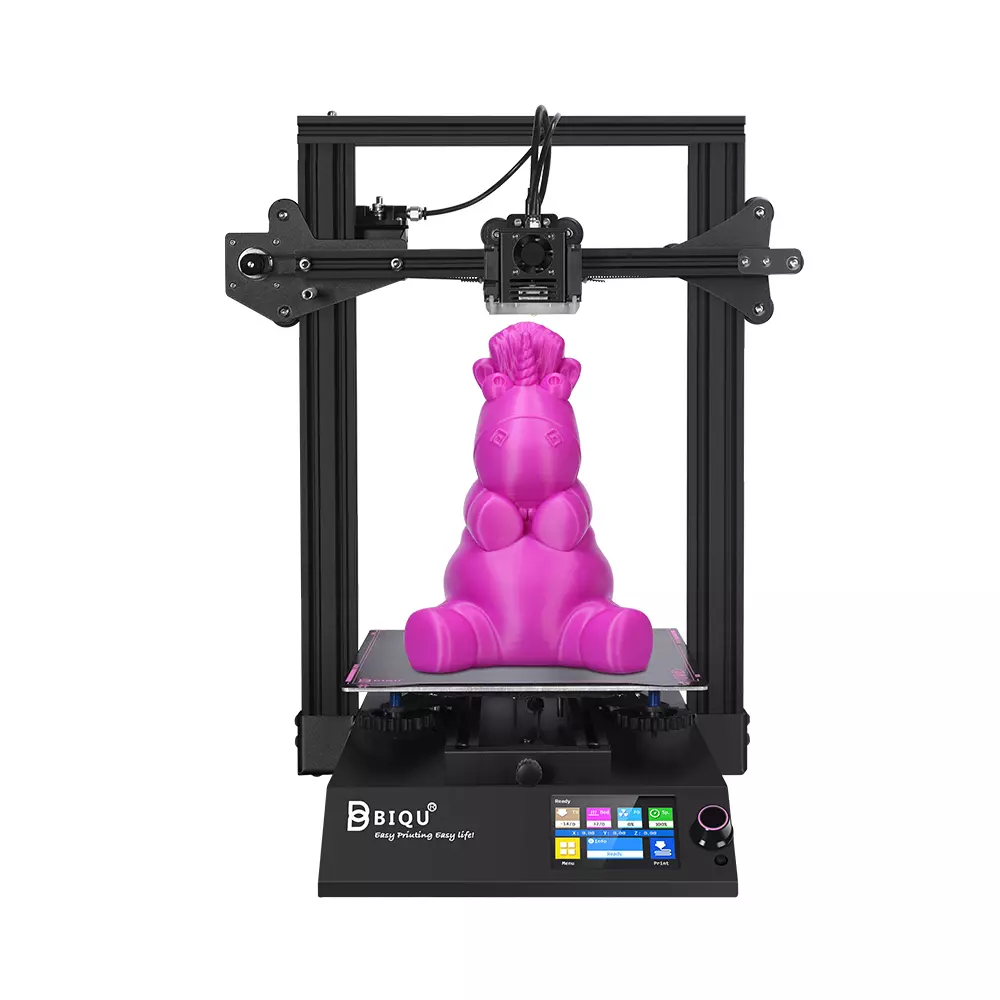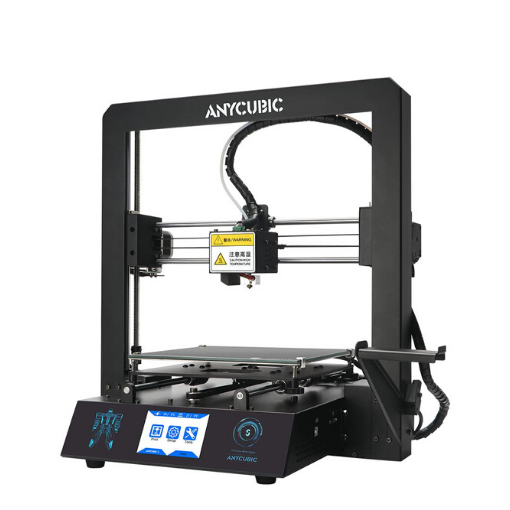Compare BIQU B1 vs Mega S
Comparison between the best 3D printers
Choose the best 3D printer at the best price. The cheapest 3D printers are here.
Buy a 3D printer here with 3D Fila.
 |
 |
|
| Model | BIQU B1 |
Mega S |
| Printing Material | Filament | Filament |
| Buy Filament for BigTreeTech BIQU B1 | Buy Filament forAnycubic Mega S | |
| Estimated price | $269,00 | $149,00 |
| Manufacturer | BigTreeTech | Anycubic |
| Release Year | 2020 | 2019 |
| Print Volume [mm] | 235x235x270 | 210x210x205 |
| Printer Size [mm] | 412x402x492 | 405x410x452 |
| Weight [kg] | 8,00 | 14,5 |
| Power Loss Recovery | YES | YES |
| Enclosed printer | NO | NO |
| Bed Leveling | Manual | Manual |
| Filament End Sensor | YES | YES |
| Bed type | Heated | Heated |
| Power supply system | Bowden | Bowden |
| Standard nozzle | 0,4 | 0,4 |
| Maximum Nozzle Temperature [°C] | 250 | 260 |
| Maximum Bed Temperature [°C] | 100 | 110 |
| Maximum printing speed [mm/s] | 100 | 100 |
| Filament holder | YES | YES |
| Camera for supervision | NO | NO |
| Recommended filaments | PLA, TPU, ABS, PETG | PLA, TPU, ABS, PETG |
| Recommended slicers | Cura, Simplify, Slic3r | Cura, Simplify, Slic3r |
| Maximum Resolution [mm] | 0,1 | 0,1 |
| Processor | 32 Bits BTT SKR V 1.4 | 8 bits |
| Display | Touchscreen TFT 3,5'' | Touchscreen TFT 2,8'' |
| Power Supply | 24V / 360W | 12V / 300W |
| Connectivity | SD / USB | SD / USB |
| Operating systems | Windows, Mac, Linux | Windows, Mac, Linux |
| Date of registration in the system | 2021-04-14 | 2021-04-15 |
| Release date | 2020 | 2019 |
| Extra features | The BIQU B1 is an advanced 3D printer with a silent 32-bit BTT SKR V1.4 motherboard and ARM Cortex-M3 CPU, offering DIY interfaces (I2C, SPI, WiFi) and dual Z-axis. Its dual BTT B1 TFT35 V3.0 operating system allows real-time monitoring and multiple printing modes, including G-code visualization effects. It stands out for its BIQU SSS (Super Spring Steel), ensuring easy model adhesion and simplified removal, with the possibility of using it on both sides. It includes a filament sensor, automatically pausing printing in case of filament breakage. The multicolored RGB lights integrated into the hotend allow you to view the printing status even at night. Additional notes include the need for a BIQU-specific Type-C cable and extra interfaces for smart filament sensor and BL Touch. | The Anycubic Mega S offers a printing platform with excellent adhesion, easy removal after cooling. It has a filament sensor for a better experience with flexible materials and a multilingual and intuitive color touchscreen. Assembly is quick, requiring only 8 screws and 3 connections. It has a large build volume (210 x 210 x 205 mm), high positioning accuracy and supports a variety of materials, including TPU, PLA, ABS and wood. It stands out for its solid metal structure, superior stability, high-quality printing with layer resolution of up to 50 microns, Ultrabase for easy adhesion and removal of parts, resumption of printing after power outage, high-quality extruder for flexible filaments, suspended filament support and stable structure that reduces shaking, improving printing quality. |
| Support for multiple colors and materials (AMS and CFS) | NO | NO |
Notes * |
||
| Cost-benefit | 7 / 10 | 7 / 10 |
| Hardware | 2 / 10 | 2 / 10 |
| Tela | . | . |
| Print volume | 3 / 10 | 3 / 10 |
| Performance | 1 / 10 | 1 / 10 |
Conclusion |
| In the comparison between the BIQU B1 and the Anycubic Mega S, several key factors emerge that can help potential buyers make an informed decision based on their specific needs and budget. Both printers come equipped with similar essential features such as power loss recovery, heated beds, and filament end sensors, making them reliable choices for uninterrupted printing. The BIQU B1 offers a slightly larger print volume, which can be advantageous for users looking to create larger models. Additionally, it features a more advanced motherboard that enables greater flexibility with multiple printing modes and real-time monitoring capabilities. The multicolored RGB lights for printing status add a modern touch. On the other hand, the Anycubic Mega S is known for its solid construction and stability, which directly influences the quality of prints, especially at higher resolutions. It is designed for quick assembly and ease of use, making it a great option for beginners or users who prioritize a hassle-free setup. The Ultrabase ensures excellent adhesion and simplifies the model removal process, which can be a significant convenience in regular use. While the cost of the BIQU B1 is higher, its advanced features may justify the investment for more experienced users or those wanting additional capabilities. The Anycubic Mega S, being more budget-friendly, serves as a solid entry-level printer without skimping on performance or quality. Ultimately, the choice between the two should be guided by the intended use and budget constraints. If print volume and advanced features are priorities, the BIQU B1 could be the better option. Conversely, if ease of use and a reliable performance at a lower price point are more important, the Anycubic Mega S stands out as an excellent choice. |

